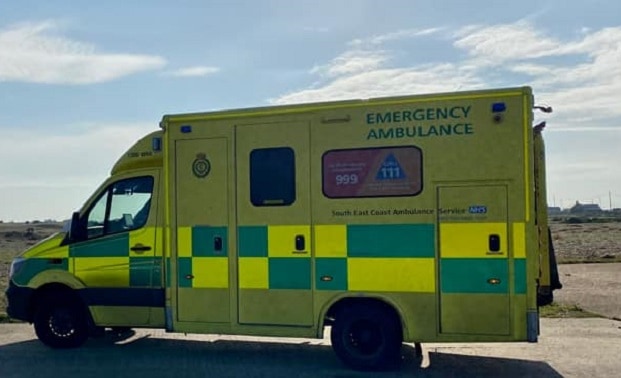
By Carly Jeffrey
During today’s (July 7) Health Overview and Scrutiny Committee meeting at Kent County Council, councillors questioned ambulance service leaders at length about performance and delays.
Cllr Joe Howes (Canterbury) asked the managers at ambulance provider Secamb if pay was the reason for staff shortages, saying: “The public sector is not paying as well as the private sector” and noting the vacancy rate at the ambulance service is still high.
Matt Webb, one of Secamb’s directors, replied saying “resourcing is a concern” and the service and the sector as a whole is trying to find solutions.
He said: “Every ambulance trust is experiencing this.
“We have to think about how we lobby and highlight this point to government … to really make this case that resourcing is a concern, and if we don’t start to look at how we retain our good people, we’re only going to struggle further down the line.”
Matt Webb also said the problem was not so much recruitment as retention of staff, stating that the problem stems from pay and conditions: “It’s around pay, it’s around wellbeing concerns and it’s around opportunity.”
Councillors grilled the ambulance service representatives Ray Savage and Matt Webb for close to an hour, expressing grave concerns about ongoing response time issues and the wellbeing and mental health of ambulance staff.
Matt Webb explained that ambulance delay problems are down to ‘capacity and demand’. Demand has risen due to the health service’s reduced activity during Covid peaks, and the capacity problem was described by him as ‘cyclical’.
He explained that handover delays between ambulances and A&E are caused in large part by A&E having problems discharging patients into the community, therefore it is a ‘system flow’ problem in community care that causes a backlog in acute care that then causes a backlog for ambulance crews and patients waiting for an ambulance.
Matt Webb also expressed his view that ambulance demand is expected to continue to rise throughout the summer as Covid infections are rising again, and emphasised that the struggle to hit target times at Secamb are replicated in trusts across the country.
Ray Savage, Strategy and Partnerships Manager at Secamb, was also present and referred to the leadership problems at Secamb highlighted by a recent CQC report, noting that the trust is working to address the issues.
A report to the HOSC members said from July 2021 until January 2022, the Trust had been operating at the highest levels of escalation. It was only in January 2022 that the Trust was able to reduce its Resource Escalatory Action Plan (REAP) from level 4 to level 3. Despite these challenges, the Trust has been able to achieve some good levels of performance in its 999 service when compared to national data.
In April, the Trust set out its 2022-23 priorities. These have been developed in response to the ongoing challenges the ambulance sector is facing, the results of the staff survey, and the high-level feedback given by the Care Quality Commission following their inspection of the Trust’s leadership.
Chairman, David Astley, has recently announced the appointment of Siobhan Melia as the Trust’s new Interim Chief Executive, following the resignation of Philip Astle in May. Siobhan, currently the Chief Executive of the Sussex Community NHS Foundation Trust will take up her new role on the July 12.
The Trust is running an ongoing recruitment programme for front line staff, including the opportunity for staff to progress towards their paramedic qualification.
Carly Jeffrey is a member of campaign group Save Our NHS in Kent

